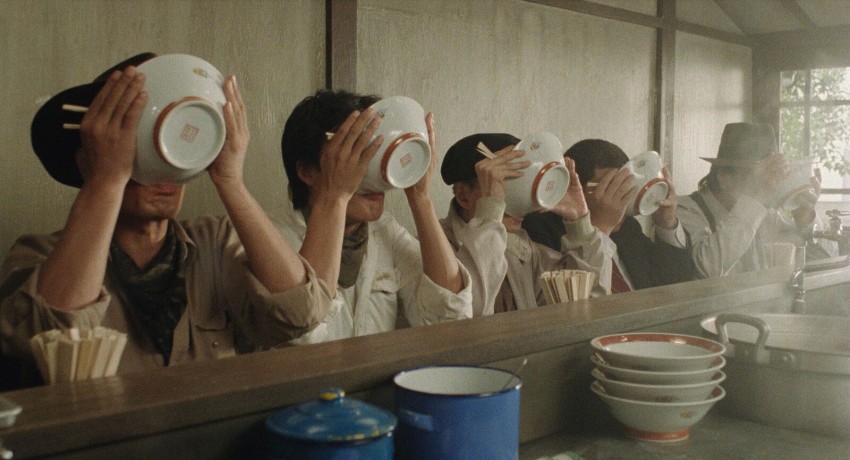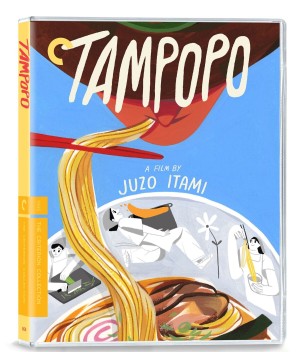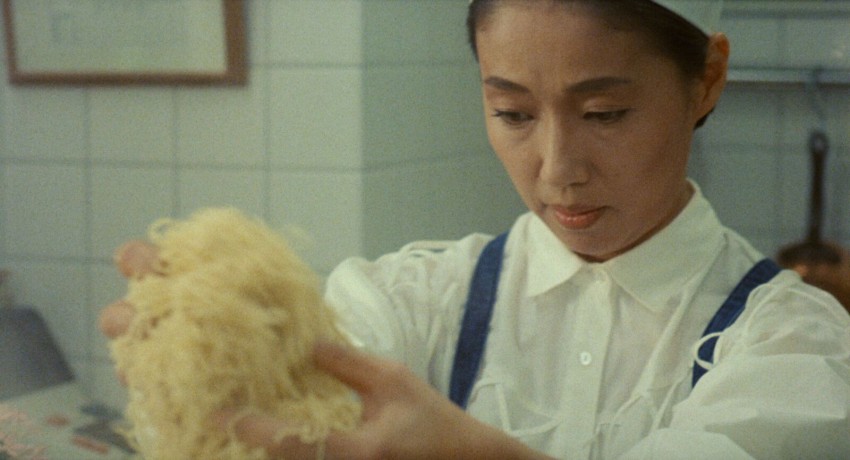Tampopo
May 9, 2017 · 0 comments
By Jeremy Clarke.
 This so-called ‘Noodle Western’ always sounded somewhat off-the-wall. It impressed when it first appeared in 1985 and viewing it again on Criterion’s new Blu-ray, Tampopo has stood the test of time well. “This’ll be famous in the history of cinema” says cast member Fukumi Kuroda in director Juzo Itami’s 90-minute edited diary of making the film, one of many excellent extras on the new disc.
This so-called ‘Noodle Western’ always sounded somewhat off-the-wall. It impressed when it first appeared in 1985 and viewing it again on Criterion’s new Blu-ray, Tampopo has stood the test of time well. “This’ll be famous in the history of cinema” says cast member Fukumi Kuroda in director Juzo Itami’s 90-minute edited diary of making the film, one of many excellent extras on the new disc.
 Kuroda plays the girlfriend of an unnamed, white-suited gangster (a pre-Shall We Dance Koji Yakusho) and the couple share a number of scenes involving sex and food. One involves him putting an egg yolk in his mouth which the couple then pass back and forth between them from mouth to mouth until it finally breaks and spills out onto her dress. You can find out the finer points of how they filmed this by watching the diary. Yakusho also gets a memorable death scene, bloodily gunned down by unseen assailants in a rain-swept. He then proceeds to tell his lady love about wild boar being hunted and turned into yam sausage on account of their diet, before he passes away in her arms.
Kuroda plays the girlfriend of an unnamed, white-suited gangster (a pre-Shall We Dance Koji Yakusho) and the couple share a number of scenes involving sex and food. One involves him putting an egg yolk in his mouth which the couple then pass back and forth between them from mouth to mouth until it finally breaks and spills out onto her dress. You can find out the finer points of how they filmed this by watching the diary. Yakusho also gets a memorable death scene, bloodily gunned down by unseen assailants in a rain-swept. He then proceeds to tell his lady love about wild boar being hunted and turned into yam sausage on account of their diet, before he passes away in her arms.
Such subject matter points to the fact that this movie is primarily about neither sex nor violence but food preparation and eating. The gangster couple’s scenes and a number of other vignettes function as asides to the main plot, adding to the viewer’s enjoyment of it in much the same way that side dishes set off a main course. Hence, we see numerous unrelated scenes in restaurants, scenes involving the gangster couple and a particularly wonderful episode in which a tramp breaks into a closed restaurant kitchen late at night to make an omelette. Some, such as the old man at the next table choking on some food, come to involve the leading characters, others appear completely unrelated yet fit perfectly into the piece’s overall scheme.
In the classic 1953 Hollywood Western Shane, a stranger comes to town and tries to settle down, but ultimately moves on. In Tampopo, truck driver Goro (Tsutomu Yamazaki) is persuaded to stay in Tokyo by ramen shop-owner widow Tampopo (the director’s wife Nobuko Miyamoto) so he can teach her how to make perfect ramen. At the end of the film, having achieved this end, he moves on.
There is much for Tampopo to learn. In a pastiche of many a sports manga, Goro starts off giving her Olympic-style training, repeatedly carrying a heavy pot of water from one side of her kitchen to the other. There are sessions where she prepares food upon which Goro and others pass judgement. She makes numerous trips to rival restaurants in an attempt to inveigle closely guarded, secret recipes of their owners.
 Unbelievably, the dramatic tension mounts as she cuts a deal with a dodgy-looking customer of one restaurant who leads her down a dark passage for some nefarious purpose. This turns out to be a peep hole through which where she can watch another chef who has been particularly guarded about his culinary secrets. Another unlikely but welcome extra on the disc has three US ramen chefs discuss their experiences, one of them relating that this is exactly the sort of exploit with which hopefuls in the process of learning the trade get involved in Japan.
Unbelievably, the dramatic tension mounts as she cuts a deal with a dodgy-looking customer of one restaurant who leads her down a dark passage for some nefarious purpose. This turns out to be a peep hole through which where she can watch another chef who has been particularly guarded about his culinary secrets. Another unlikely but welcome extra on the disc has three US ramen chefs discuss their experiences, one of them relating that this is exactly the sort of exploit with which hopefuls in the process of learning the trade get involved in Japan.
There are other impressive extras too. The enjoyable trailer is almost a short film in itself. Juzo Itami’s rambling if likeable 1962 half-hour short Rubber Band Pistol sees the director appear as a member of the young, ensemble cast. In addition, a worthwhile film essay by Tony Zhou and Taylor Ramos explores Tampopo’s themes of amateurism, craftsmanship and self-improvement.
Lead actress Nobuko Miyamoto, who more recently voiced Ouna in The Tale of the Princess Kagoya, gets a ten-minute interview in which she explains how radical a female leading role the part was in its day when “female leads tended to follow male leads” — although some have argued that’s exactly what her character does. Tampopo is essentially a lone, single parent building a long-term career. Miyamoto also reveals how the process of repeatedly shaking the noodles dry gave her peritendinitis (inflammation of the tissues around a tendon).
A second ten-minute interview features food stylist Seiko Ogawa, who describes her job as “consumable props”. She was the person who prepared all the food for shooting in a specially constructed area near the sound stage on the Nikkatsu lot, and was constantly being visited by hungry members of cast and crew. She remembers being out of shot in the gangster/girlfriend egg yolk scene “handing them the yolks”. The film clearly holds a fond place in her memories as she describes it as a career high.
The real gem among the extras, though, is the Itami diary, which is where we came in. We learn that scenes where you see hands but not faces preparing food feature real chefs rather than actors. This applies to the scene in which a live turtle is gutted with a knife, which appears to be uncut by the BBFC in the current version. And towards the end, Itami shows us without music the scene in which new customers enter Tampopo’s restaurant and Goro and others leave. Then he shows us his various attempts both unsuccessful and successful at adding music to the scene. Like many other elements in this diary, it’s a masterclass in filmmaking, elevating this disc to one of those very few, must-have discs in any respectable home video collection. As if the film itself wasn’t extraordinary enough in the first place.
Tampopo is released on UK Blu-ray by Criterion.
Leave a Reply